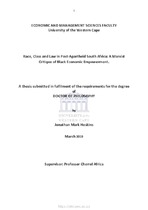Race, class and law in post-Apartheid South Africa: A Marxist critique of Black Economic Empowerment
Abstract
With the advent of democracy, the ANC government was faced with the problem of addressing abject poverty, persistent unemployment and rank economic inequality that beset black South Africans under apartheid. To address these problems in a structured and comprehensive fashion, the Broad-Based Black Economic Empowerment Act 53 of 2003 (BBBEE Act) was promulgated. Several economists believed that growth in the economy is the bedrock upon which black economic empowerment would provide the foundation to correct these economic problems. This study sought to interrogate black economic empowerment as a means to address economic inequality and unemployment. The method of analysis and critique employed in this study is based on theories that Marx formulated in Capital: A Critique of Political Economy. In particular, this study draws on Marx’s theories of fictitious capital, surplus value production and appropriation, and the creation of the industrial reserve army. The thesis uses the theory to examine two BEE cases namely the Sanlam and Sasol equity transactions. It also analyses the relationship between productive capital and fictitious capital through an examination of Lonmin plc and Shanduka Pty Ltd, with a focus on the use of labour power to produce surplus value. Finally, it looks briefly at Sanlam and Sankorp to understand the rise of the black middle class in South Africa. Ultimately, this study charts a Marxist path to explain why black economic empowerment is unable to address economic inequality and unemployment. At the centre of this study is the problematisation of the capitalist mode of production on which black economic empowerment rests. The central argument advanced is that the very capitalist structure upon which this growth strategy was based, in fact laid the foundation for the reproduction of these self-same phenomena.

